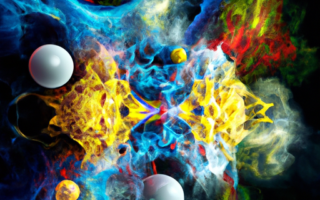The Meaning and Origins of Abstraction in Different Disciplines
Understanding the concept of abstraction is crucial in various disciplines, as it plays a significant role in art, science, and everyday life. Abstraction refers to the process of simplifying complex ideas or objects by focusing on their essential characteristics, omitting irrelevant details. This approach allows for a deeper understanding of the subject matter and facilitates communication.
The meaning and origins of abstraction differ across different disciplines, but they are unified by the underlying principle of extracting essential elements from a larger whole. In art, abstraction emerged as a revolutionary movement in the early 20th century, challenging traditional representational approaches. Artists began to move away from realistic depictions and instead explored non-representational forms, shapes, and colors. This shift enabled them to convey emotions, concepts, and ideas in a more abstract and subjective manner.
In science, abstraction serves as a fundamental tool to simplify complex phenomena and create models that represent reality. Scientists often work with abstract concepts and mathematical models to explain natural phenomena and formulate theories. Through abstraction, scientists can focus on key variables and relationships, leading to new insights and discoveries.
Abstraction also plays a crucial role in everyday life, particularly in problem-solving and decision-making. When faced with a complex problem, individuals often abstract the essential aspects to gain a better understanding of the situation. By focusing on key elements and filtering out distractions, one can develop innovative solutions and make informed choices.
The origins of abstraction can be traced back to ancient civilizations, as evidenced by abstract symbols found in cave paintings and early forms of hieroglyphics. Over time, abstraction became more prominent, evolving in various cultural contexts and artistic movements. It gained recognition as a valid approach to artistic expression and a powerful tool in scientific inquiry.
In conclusion, the concept of abstraction holds great significance in art, science, and everyday life. Its ability to simplify complex ideas and objects while retaining their essential characteristics allows for a deeper understanding and effective communication. Whether in the realm of art, science, or problem-solving, abstraction continues to play a vital role in shaping our understanding of the world.
Exploring the Impact of Abstraction in Artistic Expression
Exploring the Impact of Abstraction in Artistic Expression
In the realm of art, abstraction has been a driving force behind some of the most powerful and influential works throughout history. It is a concept that goes beyond the confines of representation, allowing artists to distill their ideas and emotions into pure forms and colors. By stripping away the unnecessary details, abstraction aims to present the essence of a subject, evoking emotions and engaging the viewer’s imagination.
One of the key impacts of abstraction in artistic expression is its ability to transcend boundaries and communicate across different cultures and eras. Unlike representational art, which may be tied to a specific time or place, abstract works can resonate with viewers from various backgrounds, inviting them to interpret and connect with the artwork on a personal level. This universality of abstraction allows for a broader range of meanings and interpretations, making it a powerful tool for artists to express complex ideas and emotions.
Abstract art also challenges traditional notions of beauty and aesthetics. While representational art often focuses on the realistic portrayal of subjects, abstraction allows artists to experiment with different forms, colors, and techniques. This freedom from strict realism opens up a world of possibilities, encouraging artists to push the boundaries of creativity and explore new ways of visual expression. As a result, abstract art has often been at the forefront of artistic innovation, inspiring new movements and pushing the envelope of what is considered art.
Furthermore, abstraction in art can also serve as a means of capturing the intangible aspects of the human experience. Emotions, thoughts, and abstract concepts that may be difficult to grasp or articulate can find a visual voice through abstraction. Artists can create visual metaphors and symbols, using abstract forms to represent complex ideas that go beyond literal representation.
Beyond the realm of art, the impact of abstraction can also be seen in various aspects of everyday life and even in scientific research. The ability to distill complex concepts into simplified forms and models is a fundamental aspect of abstraction. In fields like mathematics, physics, and computer science, abstraction allows researchers to develop theories and models that capture the essence of complex systems and phenomena, enabling further analysis and understanding.
In conclusion, abstraction plays a crucial role in artistic expression, offering artists a powerful tool to convey ideas, emotions, and concepts. Its ability to transcend boundaries, challenge traditions, and capture the intangible aspects of the human experience makes abstraction a significant force in art, science, and everyday life.
Analyzing the Role of Abstraction in Scientific Discovery
Aby zrozumieć rolę abstrakcji w odkryciach naukowych, musimy najpierw zdefiniować samą abstrakcję. Abstrakcja jest procesem polegającym na wyodrębnianiu i uproszczeniu istotnych elementów rzeczywistości, ignorując tymczasowo te, które są mniej istotne. Jest to kluczowe narzędzie zarówno w dziedzinie nauk przyrodniczych, jak i społecznych, umożliwiające badaczom spojrzenie na świat w oderwaniu od szczegółów.
W nauce abstrakcja odgrywa znaczącą rolę, umożliwiając badaczom spojrzenie na zagadnienia i zjawiska w sposób bardziej ogólny. Poprzez abstrahowanie od nieistotnych detali, naukowcy są w stanie dostrzec powtarzające się wzorce i prawa ogólne, które rządzą danym obszarem badań. Na przykład, w fizyce abstrakcja pozwala badaczom na sformułowanie matematycznych równań, które opisują ruch planet i gwiazd, pomijając szczegóły dotyczące każdej poszczególnej planety.
Abstrakcja ma również zastosowanie w innych naukach, takich jak biologia, chemia czy psychologia. W biologii, badacze często analizują ogólne właściwości organizmów, ignorując detale dotyczące pojedynczych osobników. W chemii, abstrakcja pozwala na opracowanie modeli cząsteczek, które upraszczają złożone struktury, umożliwiając lepsze zrozumienie procesów chemicznych.
Poza nauką, abstrakcja ma jednak równie duże znaczenie w naszym codziennym życiu. Pomaga nam dokonywać generalizacji i uogólnień, co pozwala nam lepiej zrozumieć i poradzić sobie z różnymi sytuacjami. Na przykład, widząc różne modele samochodów na drodze, jesteśmy w stanie zidentyfikować ogólne cechy, które te modele łączą, i dostosować nasze zachowanie na drodze w zależności od tych ogólnych zasad.
Abstrakcja jest zatem nieodzowna zarówno w dziedzinie nauki, jak i w naszym codziennym życiu. Pozwala nam na skupienie się na istotnych aspektach, odrzucając tymczasowo szczegóły, które mogą odwracać naszą uwagę. Dzięki temu możemy wyodrębnić ogólne prawa i zasady, które rządzą danym obszarem badań lub życia. W konsekwencji, abstrakcja jest kluczowym narzędziem umożliwiającym postęp naukowy i lepsze zrozumienie świata, w którym żyjemy.
The Practical Applications of Abstraction in Daily Life
Understanding the concept of abstraction is not only important in the realms of art and science but also in our everyday lives. Abstraction is the process of simplifying complex ideas or objects by focusing on their most essential features and disregarding unnecessary details. It allows us to conceptualize and comprehend the world around us more efficiently, making it an invaluable tool in problem-solving, decision-making, and creative thinking.
One practical application of abstraction in daily life is in organizing and categorizing information. Whether it’s organizing files on our computers, arranging books on shelves, or sorting emails in our inboxes, abstraction helps us create systems that make finding and retrieving information easier. By abstracting information into categories or folders based on their similarities or relevance, we can quickly locate what we need without being overwhelmed by an avalanche of unorganized data.
Abstraction is also prominent in communication. When explaining complex concepts or ideas, we often use analogies or metaphors to convey the essence of the topic without getting lost in intricate details. By abstracting the main points and presenting them in a simplified manner, we can make our messages more accessible and comprehensible to a broader audience. This is particularly important in fields such as education, where teachers often need to break down challenging subjects into more digestible chunks.
In problem-solving, abstraction helps us focus on the core elements of a problem and develop strategies to address them effectively. By abstracting the problem to its fundamental components, we can identify patterns, similarities, and underlying principles that can be applied to various situations. This allows us to create general solutions that can be adapted and modified to fit specific instances, saving time and effort in the long run.
Furthermore, abstraction plays a crucial role in innovation and creativity. Artists, for instance, often use abstraction to convey emotions or ideas, distilling them into simplified forms, colors, or gestures. This allows the viewer to interpret and connect with the artwork on a more subjective and personal level, evoking unique and individual responses. Similarly, scientists use abstraction to simplify complex phenomena and develop models or theories that can help further our understanding of the natural world.
In conclusion, abstraction is an essential concept that has practical applications in various aspects of our daily lives. Whether it’s in organizing information, improving communication, problem-solving, or fostering creativity, abstraction enables us to simplify complexity and navigate the world more efficiently. By embracing the power of abstraction, we can enhance our ability to understand, interpret, and engage with the world around us.



